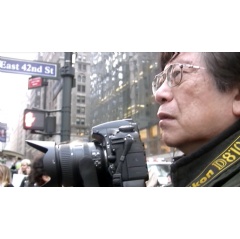


Corky Lee, a Chinese-American photojournalist, dedicated his life to capturing the vibrant street life and rich culture of New York's Chinatown [a84acc8d]. Since 1970, Lee documented the diversity of Asian American communities and played a crucial role in documenting key events in their political history. His work aimed to challenge stereotypes and showcase the presence and contributions of Asian Americans in the United States. Lee's photographs have been compiled in a book titled 'Corky Lee's Asian America: Fifty Years of Photographic Justice,' which features his iconic images along with commentary from those who knew his work. The book was launched with an event at the Asia Society in New York. Sadly, Lee passed away in January 2021 during the Covid pandemic, leaving behind a powerful legacy [a84acc8d].
Lee's photographs offer a glimpse into the life and activism of New York's Chinatown and other Asian American communities over the decades. The images capture moments of protest, celebration, and everyday life, showcasing the resilience and spirit of these communities. The article includes a selection of twelve of Lee's photographs, providing a visual narrative of the vibrant culture and history of New York's Chinatown [a84acc8d].
The Center for Asian American Media (CAAM) presents a new documentary film about the life and career of Corky Lee. The film, titled 'Photographic Justice: The Corky Lee Story,' will premiere on May 13, 2024, on PBS [dd441c7c]. The documentary explores Lee's work and the importance of Asian American Pacific Islander (AAPI) history through his photography. It delves into his role as 'The Undisputed, Unofficial, Asian American Photographer Laureate' and highlights the celebrations, struggles, and daily lives of AAPI communities that he documented over 50 years. Produced by All is Well Pictures in Association with Ford Foundation and Scandobean Productions, the film pays tribute to Lee's legacy and his contributions to the field of photography and AAPI history [dd441c7c].
Photographer Lee Chapman, known for his work capturing the ever-changing landscape of Tokyo, has developed a distinct artistic voice that reflects themes of grief, loss, and resilience [a2a259c0]. Chapman, who moved to Japan over 20 years ago, uses photography as a means of coping with personal tragedy and preserving parts of the city that are undergoing significant change. His images have evolved from simple documentation to intimate portraits of life in Tokyo, influenced by the pandemic and the loss of his wife. Chapman's photography offers a profound perspective on the city and its people, capturing moments of everyday life and preserving them for posterity [a2a259c0].
Sources: [a84acc8d] [dd441c7c] [a2a259c0]